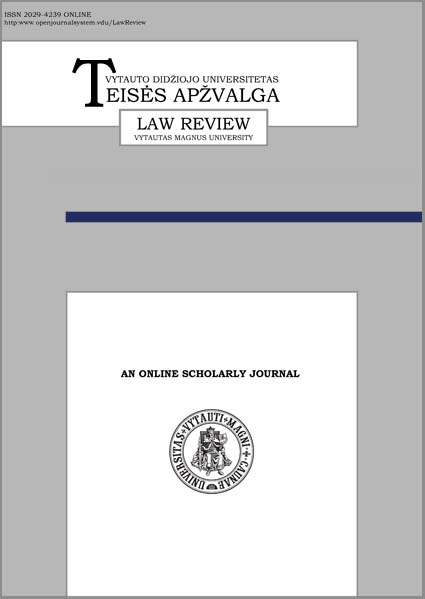Konfidencialumo užtikrinimo ir skaidrumo principo santykis viešuosiuose pirkimuose
The Connection Between Confidentiality Assurance and Transparancy Principle in Public Procurement
Author(s): Dovilė JankauskytėSubject(s): Law, Constitution, Jurisprudence, Corruption - Transparency - Anti-Corruption
Published by: Vytauto Didžiojo Universitetas
Keywords: Public procurement; Confidentiality; Transparency principle; Competition;
Summary/Abstract: The article contains a detailed analysis of the legal regulation of confidentiality assurance requirements or, in other words, the obligation to protect confidential information during public procurement: the legal regulation of the European Union as well as the provisions of the implementing law on Public Procurement are analysed and an assessment of these provisions in scientific legal literature is provided. After analysing the aforementioned legal regulation, it is concluded that the legal regulation of the European Union that presupposes the primary conclusion that contracting authorities must ensure in all cases the protection of information transferred to them by suppliers and defined as confidential by the suppliers only applies if the national legal regulation implementing this regulation does not stipulate otherwise. An assessment of the national legal regulation, inter alia, a comparison of the provisions of Public Procurement that were valid before 1 July 2017 with the provisions of the Law on Public Procurement that came into force on 1 July 2017 shows that the national legal regulation of the Republic of Lithuania regarding the protection of confidential information during public procurement is becoming stricter, i.e. the Law on Public Procurement provides not only for the protection of confidential information as such, but it also defines which information may be considered confidential and vice versa, which information is not regarded as confidential during public procurement even if the supplier indicated that the information is allegedly confidential. Further, the article analyses specific types of information that may be considered confidential, i.e. trade (business) secret and confidential aspects of a proposal; the notion and the characteristics of the specified information are discussed. In addition, the notion, characteristics, and analysis of information that cannot be considered confidential during public procurement are presented and it is clearly indicated that the entire proposal cannot be regarded as confidential under any circumstances. It is also emphasised that the list of information that cannot be considered confidential (with certain exceptions) provided in the Law on Public Procurement is not final. Any other information, even though it is not directly referenced in the law, will not be regarded as confidential either unless the supplier provides proof confirming the need for ensuring data confidentiality during public procurement. After the analysis of the notion of confidential information, entities of confidential information and their rights and obligations are analysed. It is determined that the main entity with the most rights and obligations according to the confidentiality legal regulation is the owner of confidential information, i.e. the supplier participating in public procurement because the assessment of any information as confidential or non-confidential is possible only if the supplier specifies the confidentiality of the information. If the supplier states and explains in the proposal that information given in the proposal is confidential, the contracting authority as well as the public procurement commission of the contracting authority, its members or experts and other persons cannot disclose this information to third persons. In other words, the specified entities are obligated to ensure proper and sufficient protection of the supplier’s confidential information, i.e. information labelled as confidential by the supplier cannot be given to third persons who ask for it. However, it is emphasised that this obligation is not limitless: although qualification of information as confidential primarily depends on the supplier’s instruction in this regard in the proposal, such an instruction of the supplier is not as such obligatory for the contracting authority; therefore, cases when the contracting authority may ignore the supplier’s instruction are described in the article in detail. Finally, it is stated on the page that the protection of confidential information during public procurement has limits that are primarily based on the requirements of the transparency principle. Public procurement under market economy conditions is impossible without transparent implementation as a direct precondition for fair and equitable competition. Transparency is often regarded as a means of ensuring the same view of contracting authorities acting in compliance with legal requirements on suppliers’ proposals without prioritising any of them. Therefore, legal regulation of public procurement must ensure transparency to the extent sufficient for the suppliers to compete with one another effectively, to protect infringed rights, to prevent corruption, and for the public concerned to exercise the right to receive information. One of the main means of implementing the transparency principle and the suppliers’ right to effective protection of rights is the suppliers’ right to familiarise themselves with the proposals of other suppliers. It is obvious that when suppliers seek to familiarise themselves with information comprising the proposals of other suppliers and to evaluate, including, but not limited to, the accuracy and regularity of decisions made by the organisation, two values protected by the Law on Public Procurement, namely the right to sufficient information as a form of expression of the transparency principle and the right to the protection of confidential information, collide. The connection between the right to sufficient information as a form of expression of the transparency principle and the right to the protection of confidential information is examined in the article and it is concluded that the confidentiality of information determining the obligation of the contracting authority and persons concerned not to disclose such information to third persons and the restriction of the right of other suppliers participating in the procurement to information is set only in justified cases, when the supplier actually and not merely formally explains the necessity of ensuring confidentiality of information.
Journal: Teisės apžvalga
- Issue Year: 2018
- Issue No: 1(17)
- Page Range: 4-30
- Page Count: 27
- Language: Lithuanian

